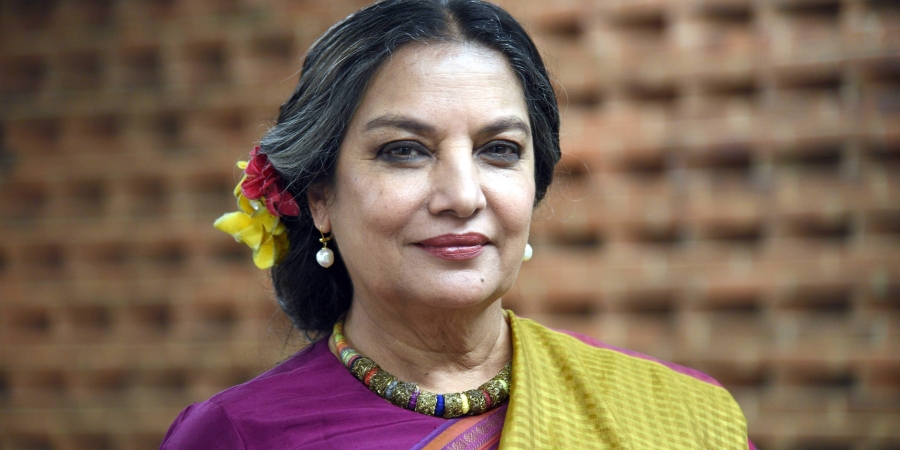NEW DELHI : Shabana Azmi still remembers the conversation she had with her father, legendary poet Kaifi Azmi, before becoming an actor.
“Will you support me?” she recalls asking her father.
“He said, ‘I will support you in whatever you do. If you want to become a shoemaker, I will support you provided you tell yourself that you will try to become the best shoemaker in the business’,” the actor said in an interview.
Elaborating on the relationship with her father, Shabana Azmi shared a childhood anecdote when she wanted to have a doll with “blonde hair and blue eyes”.
“At the age of seven, I wanted a doll with blonde hair and blue eyes like other girls in my class. But my father gave me a black doll and said ‘black is beautiful’. Telling this to a seven-year-old was quite peculiar, but these were the values we inherited from him,” she said.
Kaifi Azmi also instilled a love for India’s “composite culture” in his children that they have carried forward in their works, latest being the film “Mee Raqsam” (I Dance).
Shabana Azmi and her brother, cinematographer Baba Azmi are paying tributes to their father through the film that revolves around Salim (Danish Husain) who stands resolutely with his daughter Mariam (Aditi Subedi) when she wants to become a Bharatnatyam dancer.
Though the film is not based on the relationship that the 69-year-old actor shared with her father, she said the poet-lyricist was equally supportive of her in real life.
“The film is not based on my life with my father, but it celebrates the father-daughter bond. It was shot in Mijwan, a village in eastern UP, when my father was born. So Baba decided to make this film in his birthplace in the year of his birth centenary. There cannot be a better tribute to him,” she said.
Born on January 14, 1919 in Mijwan village, near Azamgarh in Uttar Pradesh, Kaifi Azmi would have turned 101 this year.
“Mee Raqsam”, which marks Baba Azmi’s directorial debut, celebrates India’s inclusiveness and pluralism, which the actor described as the country’s “greatest strength”.
“This film details the difference between our religion and cultural heritage. It celebrates India’s composite culture which is an extremely important message in today’s times. My father used to celebrate all festivals like Eid, Diwali, Holi, Christmas, etc with great gusto. We have carried on that tradition. It makes me happy that Zoya and Farhan have also carried on that tradition.”
“Mee Raqsam” also features Naseeruddin Shah, her co-star of many movies. He plays the narrow-minded community leader averse to Mariam pursuing Bharatnatyam, a character in stark contrast to his real life persona.
Calling Shah her “most favourite” co-actor, Shabana Azmi said he played the role so well that “obscurantism was coming out from every pore of his body”.
“Naseer and I have worked together so much that we have spent more time with each other than I have with Javed and he has with Ratna,” she quipped.
The actors, both graduates from the Film and Television Institute of India, have starred in diverse films such as “Sparsh”, “Mandi”, “Masoom”, “Paar”, “Khandhar”, among others.
“We have played poor husband and wife, rich husband and wife, and middle class husband and wife. We have done all types of roles together.
“Acting is all about reacting. When you look into the eyes of your co-star and there is truth in his eyes, giving a reaction becomes so much easier,” she added.
In the 1980 film “Sparsh”, directed by Sai Paranjpye, Shah was so convincing as a visually impaired principal that Shabana Azmi would often forget that he was not blind in real life.
“After the shots, I would often go and help him climb down the stairs, and he would say, ‘Muaaf karo, meri aankhein hain (Thanks, but I can see)’,” she recalled.
The film also helped debutante Subedi, born and brought up in Mijwan, realise her dream of becoming an actor. She previously walked the ramp at designer Manish Malhotra’s fashion show for the NGO Mijwan Welfare Society (MWS).
Founded by Kaifi Azmi, MWS was launched with the goal of creating employment opportunities for the region’s women and girls, and reviving the art of ‘chikankari’ embroidery.
“Aditi was selected after rounds of auditions. She walked the ramp at the Manish Malhotra fashion show two years ago with Shah Rukh Khan and Anushka Sharma.
“It was her dream to become an actor. Now she has worked on this film and this correlates so strongly with the character of Mariam that she plays in the film,” said the actor.
According to Shabana Azmi, the availability of content on digital platforms has been a blessing during the lockdown.
“It’s marvelous that we can view these films today on streaming services. During lockdown one thing that has kept us going is the availability of films, stories. You come to know how important these arts really are to soften the rough edges of life.”
Asked why her films like “Nishant” (1975) and “Mandi (1983) continue to resonate with cinema buffs, the actor said these movies are a part of “India’s consciousness of that time”.
“Unless you have strong roots in films, music, art, painting, or theatre, you can’t talk high and think internationally,” she added.
On the acting front, Shabana Azmi will next be seen in “Sheer Qorma”. “Mee Raqsam” starts streaming from August 21. (agencies)


